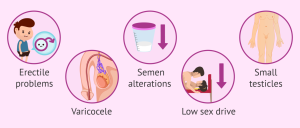In our part of the world, whenever a couple is childless, the focus is almost always on the woman. She is likely to be accused of all sorts, including having done abortion that ruined her womb.
According to fertility doctors, in any situation where a man and his wife are trying to achieve pregnancy, the couple is expected to access medical care together. “Only then can we hope to have positive result because the couple can be assessed together and ways forward charted based on medical findings.
“However, from experience and in most cases, it takes a lot of efforts to convince the men to come forward for examination and when placed on medications, it takes more efforts and coercion to make them take their drugs regularly as prescribed,” says fertility expert, Dr. Kemi Ajida.
The gynaecologist added that many men feel threatened whenever issue of fertility is mentioned in their ears and that is why it takes more efforts to convince them that they might be the ones who need treatment after their wives might have been cleared of any encumbrances.

Obesity and male fertility
While researchers have established the link between extra body weight and diseases like diabetes, cardiovascular disease and certain cancers, they also warn that many men might be less aware of the effect obesity or being overweight can have on their fertility and the health of their offspring.
According to experts at online platform Healthymale, “Overweight men are 11% more likely than their normal-weight peers to produce low numbers of sperm and 39% more likely to produce no sperm at all.”
The portal added that obese men are 42% more likely to have a low sperm count and 81% more likely to produce no sperm.
 How overweight affects male fertility
How overweight affects male fertility
Male infertility is caused by a problem with sperm production or the movement of sperm through the male reproductive system, experts say.
“These problems include semen that doesn’t contain any sperm (azoospermia), low sperm count (oligospermia), abnormal shape (which affects the sperm’s ability to fertilise the egg) and poor motility (a problem with the sperm’s ability to swim),”says another IVF specialist Dr. Olubunmi Daniels.
Dr. Daniels says, “There is a range of things that can cause male infertility, including genetic conditions, abnormal hormonal function, and lifestyle factors, including general health and weight.”
The physician said that though testosterone is a hormone needed for the production and development of mature sperm (spermatogenesis), fat cells can reduce levels of testosterone directly, by turning it into a form of estrogen, or indirectly, through the production of leptin.
“As body fat increases, leptin production rises, which reduces testosterone production. This means that obese men with high leptin levels have low testosterone levels, which impair sperm production, sex drive and erectile function,” Dr. Daniels anthused.
Inflammation associated with obesity can also damage sperm, which can change the genes that are passed on from you to your child, she added.

How weight loss improves fertility
However, according to Healthymale, a new clinical study has found obese men improved their semen quality if they lost weight with an eight-week, low-calorie diet, and maintained the weight loss.
The men involved in the research lost an average of 16.5kg, which increased their sperm counts by 40%. This improvement was maintained for a year in the men who kept the weight off.
The portal states that while there is often a strong focus on how women can improve their health to increase their chances of falling pregnant, a man’s health is also critical for conceiving, particularly when it comes to weight.
“Sperm take around 70 days to develop; so, reaching a healthier weight a couple of months before you start trying can improve the chance of conception,” Healthymale counsels.
How to lose weight

If you want to lose weight, here are some general tips:
- Avoid crash and fad diets as they’re unsustainable and can put you at risk of nutrient deficiencies
- Eat a wide variety of foods from the five food groups and choose ‘whole’, less-processed options.
- Add more vegetables to each meal — you’ll find you’re automatically eating less of the not-so-good foods when you fill up on fruit and vegetable, which are low in kilojoules and high in fibre
- Reduce your intake of foods that are high in added fat, saturated fat, sugar and salt
- Make soft drinks, lollies, snack foods and alcoholic drinks an occasional ‘extra’
- Reduce the serving portion that you were used to eating
- Practise mindful eating to help you stay present while consuming food, pay better attention to your hunger cues and cut down on overeating.
- Drink plenty of water
- Aim to do some physical activity every day, a good goal is 30 minutes daily
- Reduce the amount of time you spend sitting or lying down for long periods and break it up with a bit of movement
When should infertile couples seek treatment?
Experts at Cleveland Clinic advise that regardless of sex, couples should seek help early if any or both of them have a risk factor or medical condition that affects fertility.
Also, US-based nongovernmental organisation, March of Dimes, adds: that couples may want to think about fertility treatment if:
- They’re younger than 35 and have been trying to get pregnant for at least a year.
- They’re 35 or older and have been trying to achieve pregnancy for at least six months.
- They’re trying to achieve pregnancy and the wife has irregular, very painful or no periods.


